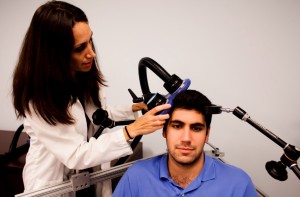Transcranial Magnetic Stimulation Continues To Show Effectiveness In Depression
 At the 2014 meeting of the Society of Biological Psychiatry, David G. Brock et al. reported that 41 of 67 depressed patients achieved remission (61.2%) after acute treatment with Transcranial Magnetic Stimulation without other medication. After three months of continuation treatment in which patients either received one maintenance TMS session per month or were simply observed, 10 of the 16 receiving active TMS continuation (62.5%) did not relapse, while 7 of the 16 who were only observed (43.8%) did not relapse. While this was not a statistically significant difference, it suggests that continuation TMS should be studied further.
At the 2014 meeting of the Society of Biological Psychiatry, David G. Brock et al. reported that 41 of 67 depressed patients achieved remission (61.2%) after acute treatment with Transcranial Magnetic Stimulation without other medication. After three months of continuation treatment in which patients either received one maintenance TMS session per month or were simply observed, 10 of the 16 receiving active TMS continuation (62.5%) did not relapse, while 7 of the 16 who were only observed (43.8%) did not relapse. While this was not a statistically significant difference, it suggests that continuation TMS should be studied further.
Andrew Leuchter et al. reported that synchronized transcranial magnetic stimulation (sTMS) at a patient’s individual alpha frequency (IAF) was more effective than sham treatment in those with prior treatment resistance (34.2% vs 8.3%) but not different from sham treatment in depressed patients who had never received treatment.
Editor’s Note: This would be important if replicated, as patients with high levels of treatment resistance do not tend to respond well to regular rTMS given at 10Hz and not matched to a patient’s alpha frequency.
RTMS Reduced Smoking
Dinur-Klein Limor reported that 10 Hz (but not 1 Hz) repetitive transcranial magnetic stimulation (rTMS) over the left pre-frontal cortex decreased cigarette consumption when given in combination with a smoking cue.

